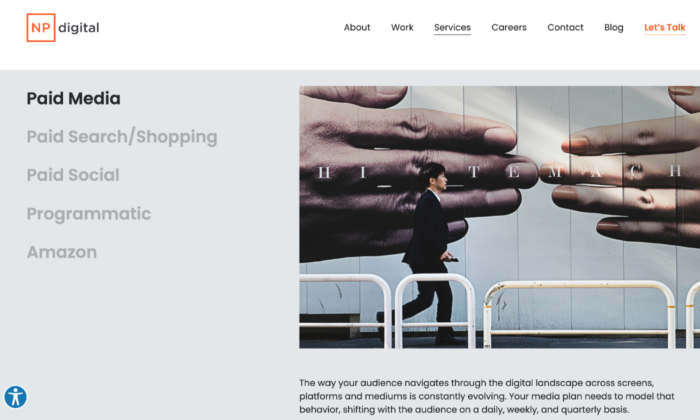
Paid advertising offers a 200% ROI. So for every dollar you spend, you get two dollars in return. It’s no surprise that nearly 80% of marketers consider PPC profitable and beneficial for their businesses.
But it’s not as easy as throwing ads up, seeing what sticks, and hoping people buy from you.
There’s a reason PPC agencies exist — managing countless moving parts, and continuous algorithm updates take time. Plus… none of those things are easy to stay on top of, either.
To make matters worse, choosing the best PPC company for your business presents a new set of challenges. So in this article, I cover my top recommendations, characteristics to look for, and what to expect working with an agency.
Let’s get started!
The 5 top PPC companies in the world
PPC is an exciting type of digital marketing because you can quickly and directly evaluate your investment return.
But whether you’re an excellent PPC manager looking to outsource or have no experience running pay per click advertising campaigns, choosing the right PPC agency isn’t always straightforward.
So to help you out, I put together this list of my top recommendations for different types of businesses.
Let’s dive in!
1. Neil Patel Digital — Best data-driven multi-channel PPC agency
Ads in search engine results aren’t the only type of PPC advertising.
Other examples include social media, programmatic, and Amazon, each with their own set of quirks and best practices.
At Neil Patel Digital, we specialize in running multi-channel PPC campaigns using first-party data from our partners. Furthermore, we take this information and use it to create strategic, high-profit campaigns that meet your audience where they are.
All while helping those in your audience make an informed decision to buy.
We’ve helped companies like Intuit, GM, and Facebook make more money authentically, using our data-driven approach to digital marketing.

2. Directive Consulting — Best for B2B, SaaS, and enterprise businesses
If you’re a B2B, SaaS, or enterprise business looking for consulting services or a dedicated PPC management partner, Directive Consulting is an excellent option.
They specialize in helping software companies around the world run high-ROI campaigns with a dedicated team running and optimizing things behind the scenes.
Directive Consulting says one of their key differentiators is the predictability of their results.
They prove it by showcasing numerous case studies outlining their results. In one example, they facilitated a 91.1% increase in lead generation in the first three months on top of decreasing their client’s cost-per-lead by 21.8%.
So you can rest assured that you’re in good hands.
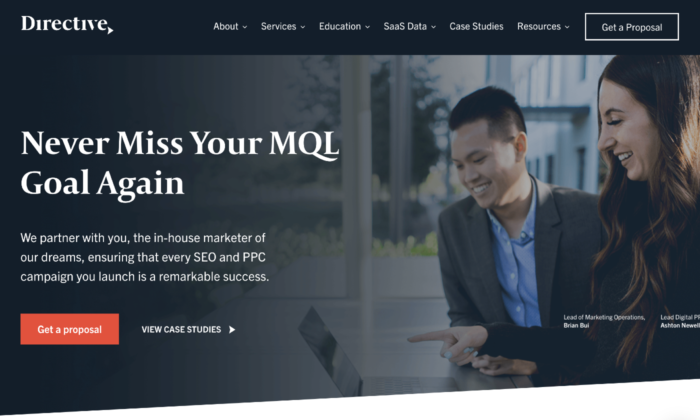
3. Stryde — Best for B2C and eCommerce businesses
B2C pay per click campaigns are vastly different from B2B campaigns. With different markets and trends, it’s essential to understand your industry’s specific ins and outs.
And who better to do that than an agency specializing in eCommerce?
Stryde is an eCommerce-specific digital marketing agency working with small and large companies all over the world.
While they focus on other aspects of digital marketing like SEO and email marketing, PPC is a huge part of what they do.
They helped Lime Ricke, a swimwear brand, achieve a 5.2x ROI. Furthermore, they helped Lucy Ave, a women’s clothing company, obtain a 4.3 ROI.
With repeatable and impressive results like these (and others outlined in their extensive portfolio), you know you’re making a smart choice.
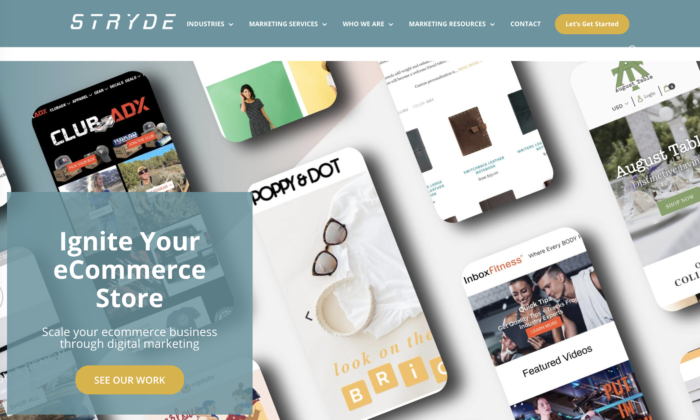
4. Loud Mouth Media — Best small agency producing big results
If you’re looking for an expert partner in search advertising or paid social, Loud Mouth Media has your back. They’re a small agency based in the UK specializing in PPC (specifically paid search and social) campaigns for businesses of all sizes.
Loud Mouth Media is partnered with Google, Bing, and Facebook as well. So you know they’re always up-to-date with the latest trends and research across those platforms.
They’re a small team of 23 expert marketers, creatives, and strategists producing impressive results for companies of all sizes around the world.
And with numerous digital marketing awards under their belt and past clients like Volvo and BBC, their credentials and portfolio make them stand out as the best small PPC agency producing massive results.
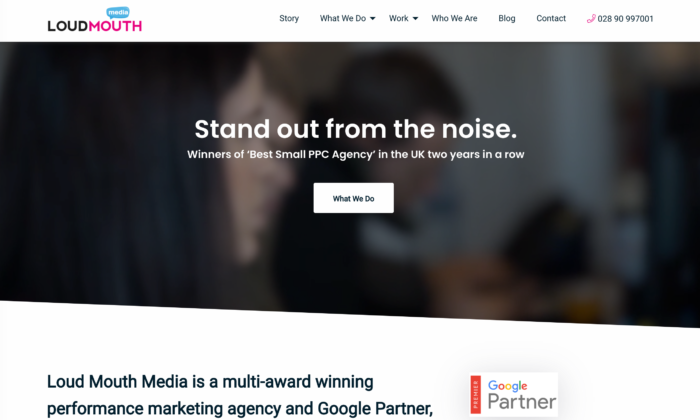
5. KlientBoost — Best for PPC management + landing page design
Strong PPC campaigns go beyond excellent ad copy, design, and targeting. Where you send your targeted traffic matters.
Which… is why it’s crucial to have well-designed landing pages optimized to convert visitors into leads or customers. At KlientBoost, they understand the importance of conversion-focused landing pages.
Their in-house team of developers, conversion designers, and top-notch marketers gives them the power to design excellent customer experiences from start to finish.
They’ve produced repeatable results like:
- 300% conversion rate increase for Juniper Networks
- 315% increase in click-through rates for Lemon Stand
- 97% decrease in cost-per-acquisition for Caresync
So, if you’re looking for a bit of help optimizing your landing pages and a dedicated PPC advertising team to target the right people and turn them into buyers, KlientBoost is for you.
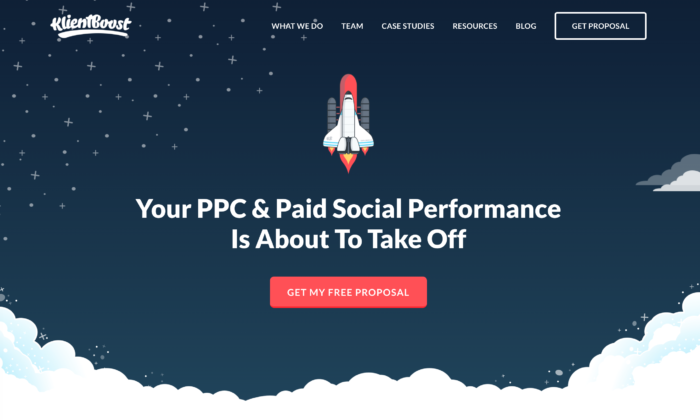
7 characteristics that make a great PPC company
Now you know my top PPC recommendations based on what you need.
Let’s move on to what makes these PPC companies the best at what they do. We’ll also walk through what to look for on your hunt for the best option for your business.
1. Extensive industry knowledge
The best PPC campaigns focus on the right audiences and the right keywords. But not all audience segments or keywords are equal.
Understanding what works and what doesn’t comes from experience and in-depth industry knowledge. Without the two of those, you’re banking on intuition.
Which… works sometimes, but that’s not what you should expect from a top PPC agency.
Take a look at who’s a part of the agency’s team and take some time to evaluate their experience level and expertise in your specific industry.
You can also look at their published case studies in different industries to see the types of results they produce for their clients.
If you’re not confident in their knowledge in your industry, move on to an agency that feels like a better fit.
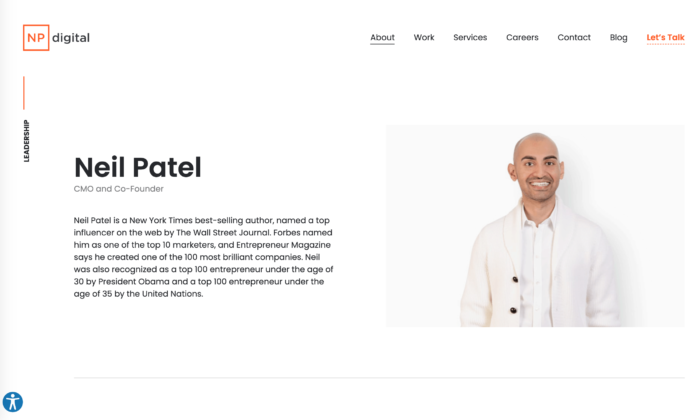
2. Advanced analytics and reporting
Analytics and reporting are essential aspects of any PPC campaign.
They help you get a better understanding of what segments and copy work well to shift your budget toward high-profit ads while reducing ad spend on those that don’t work.
So your PPC agency must provide accurate and transparent reporting, so you always know where every dollar goes and the ROI it produces.
Furthermore, top PPC agencies aim to collect as much information as possible regarding everything about your campaign.
This insight helps them to adapt and produce higher ROI campaigns with first-party data directly from your business.
You may not be able to find out much about this from an agency’s website. So it’s important to ask questions regarding the data and metrics they measure to influence their suggestions and future campaign strategies.
3. Intent-driven keyword selection
The top PPC marketers know the best way to improve ROIs and reduce wasted ad spend is by focusing on transactional keywords rather than informational keywords for paid search marketing.
Why? Because people searching for transactional terms are more likely to spend money.
And good PPC strategists know this is the best way to get your business in front of the right people at the right time without wasting ad spend on irrelevant terms that aren’t going to turn into purchases.
You may have a hard time learning about this from their website. So be sure to ask questions and gauge their knowledge around intent-based search queries before moving forward.
4. First-party data sources and strategic partnerships
Search engines and social media platforms are continually updating their algorithms to be as human as possible to provide the best experience for their users.
So the best PPC companies to partner with are on top of these continuous changes.
Search and social partnerships provide those deep insights and industry trends non-partners don’t have.
Furthermore, agencies with a pool of first-party data sources have a first-hand look at your audience’s attributes and behavior to make strategic decisions regarding your campaign before using your ad spend to test the market.
Look for partnership badges for major search engines and social media platforms on their website. You can also look for an indication of first-party data sources.
5. Mobile optimization
Fifteen years ago, mobile browsing and searching weren’t around. But today, mobile devices account for more than 50% of all searches made around the world.
But there’s something else a bit more interesting. Mobile devices account for 53% of paid clicks, which means there’s a huge opportunity (and need) to optimize your paid search strategy for mobile.
On top of that, there are nearly 3.5 million mobile social media users across the globe. So the opportunity for mobile-optimized paid social media campaigns is massive as well.
This makes an excellent case for mobile PPC campaigns. And the best PPC companies know this. So make sure the company you choose is prepared to strategize and optimize your campaigns for mobile devices.
You may have to ask questions if you can’t find this information on their website.
And if you’re not confident in their mobile capabilities, move on to a different PPC agency.
6. Local PPC capabilities
90% of shoppers turn to search engines when looking for information on local businesses, and 33% perform these types of searches every day.
Pair that with the fact that 40% of total clicks go to the top three ad spots for transactional keywords, and you have a strong argument for local paid search marketing.
So if your business operates in specific areas or you have a physical location to sell products or meet with potential customers, local paid search experience and capabilities are must-haves.
Some PPC agencies specialize in local PPC, but that doesn’t mean those that don’t can’t produce impressive results.
So be sure to ask questions to ensure you’re a good fit for each other.
7. Multi-channel PPC services
If you’re looking for a specific type of PPC marketing, this isn’t necessarily a deal-breaker.
But if you’re interested in cross-channel marketing, it’s easier to run all your campaigns through a single agency.
And the more you work with them, the more in-tune they become with your business, industry, and specific campaign goals. Plus, you have the benefit of communicating and coordinating with one agency rather than managing several at the same time.
Furthermore, you don’t have to worry about misaligned messaging from one platform to the next.
So carefully consider where your target audience hangs out. Don’t forget to consider search engines, social media, paid shopping, and programmatic advertising on sites they frequently visit.
Then, choose a PPC agency experienced in those areas.
What to expect from a great PPC company
If you’ve never worked with a PPC company before, it’s hard to know what to expect. So now that you know what to look for let’s talk about what working with one of the best PPC companies looks like.
The details of each phase look different depending on the company you’re working with, but the general approach is typically the same.
Phase 1: Discovery
The best PPC companies do everything they can to learn everything there is to know about your business and what you’re looking for. So, the first step to any new PPC project is discovery and onboarding.
During this phase, you and your agency should hash out:
- Your budget (including monthly ad spend)
- The goals for your PPC campaign
- What makes your business different from your competitors
- How to improve your landing pages to increase conversions
- Specific details about your business and target audience like where they hang out online, when they tend to shop, and where they live
- What happens next
This is your chance to share everything you can possibly think of with your PPC agency. Even if it doesn’t feel relevant, it may be crucial to your success. So come into this phase as an open book with an open mind.
Phase 2: Planning and testing
Once the agency understands your business, target audience, and marketing goals, it’s time to plan your upcoming campaign. This includes defining critical metrics and KPIs as well.
This phase may also include running a small, low-budget pilot campaign to test different audience segments, copy, and overall execution.
So, the more information you know about your target audience, the easier this will be.
By the end of this stage, you’ll have a plan in place for full-scale execution and a deeper understanding of how you’re going to work together moving forward.
Phase 3: Full-scale execution
Now it’s time to launch the full campaign. The specifics of this depend on the type of advertising and the agency you’re working with.
Your project could be short-term, long-term, or ongoing. But during this time, you should get regular feedback and thorough reporting outlining everything about your campaign.
And when your campaign comes to a close, you should have a clear picture of your results.
Phase 4: Next steps
Lastly, your agency will walk you through the data they collected and explain what everything means. They’ll also probably provide suggestions and feedback on what they can improve if you want to continue working together.
This stage should also cover what happens next.
Strategy + creative + the right audience segments = high ROI
Hiring a top PPC company is a smart choice if you’re looking to save time, strategize with experts in your industry, and enjoy short-term results (when compared to something like SEO).
But choosing a PPC agency you can trust is harder than it sounds.
So whether you’re looking for advice or someone to take over and manage your campaigns, use these tips and recommendations when making your decision.
Do you have any experience vetting and hiring a PPC agency? What criteria did you consider when making your decision?
source http://feedproxy.google.com/~r/KISSmetrics/~3/BmUMhKQ9P_A/
No comments:
Post a Comment